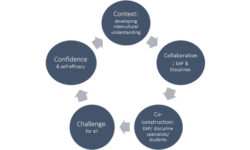Ethos, aims and principles
Ethos:
The Language Centre at the University of Leeds is an academic centre which focuses on language education and academic English and literacies often within specific disciplinary contexts and from foundation to postgraduate levels.
We have developed a strong collective identity over time and it is constantly evolving. With a large community of lecturers and practitioners, supported by dedicated professional service colleagues, we have wide-ranging expertise including language pedagogy, English language, communication, intercultural communication and English for academic purposes (EAP) and linguistics. Our teaching is informed by scholarship and research and enhanced by the integration of digital technologies.
We strive to create an academic culture which is focused on students as individuals, is collaborative, reflexive, ethical and inspiring. We are working towards making our community diverse and inclusive and sensitive to barriers that may be faced by some. We recognise a need to be flexible and responsive to changes and aspire to highlight the critical centrality of language to higher education, to knowledge creation and to understanding amongst social groups. We work in partnership with other subjects and disciplines through embedded language pedagogy across the University.
Aims:
-
-
-
-
-
-
- To enable students to take ownership of their own learning
- To surface occluded cultural practices and processes and thereby reduce cultural and linguistic barriers to learning
- To enable students to develop their ability to achieve the ‘appropriate arrangement of both content information and language in order to create extended spoken or written discourse’ (Bruce, 2008: 4)
- To enable students ‘to develop the means to negotiate and respond to the requirements of assignment genres’ (Bruce, 2011: 67)
-
-
-
-
-

Fig 1: Five Pillars of EAP
Principles:
EAP or academic language and literacy development
-
-
-
-
-
-
- is available to all students
- values the diverse nature of the student cohort and works to be inclusive of all
- is developed in partnership with disciplinary academic programmes
- acknowledges disciplinary differences but builds on cross-disciplinary connections
- is student-centred and driven by student need
- is participatory, collaborative and co-constructed
- is holistic and embodied, acknowledging cognitive, emotional and social factors of learning
- is core to knowledge creation and communication
-
-
-
-
-
Through collaboration with academics in other disciplines, we seek to develop and disseminate insights into areas that, following Ferguson (1997:85), should form the foundations and knowledge base of EAP insessional practice:
-
-
-
-
-
-
- Knowledge of disciplinary cultures and values; a form of knowledge which is essentially sociological or anthropological.
- Knowledge of the epistemological basis of different disciplines; a form of knowledge which is philosophical in nature.
- Knowledge of genre and discourse, which is mainly linguistic in nature.
-
-
-
-
-
References:
Bruce, I. 2008. Academic Writing and Genre: A systematic analysis. London: Continuum.
Bruce, I. 2011. Theory and concepts of English for Academic Purposes. Basingstoke: Palgrave Macmillan.
Ferguson, G. 1997. Teacher education and LSP: The role of specialized knowledge. In: Howard, R. and Brown G. eds. Teacher education for languages for specific purposes. Clevedon, England: Multilingual Matters.
NEXT: Reading list